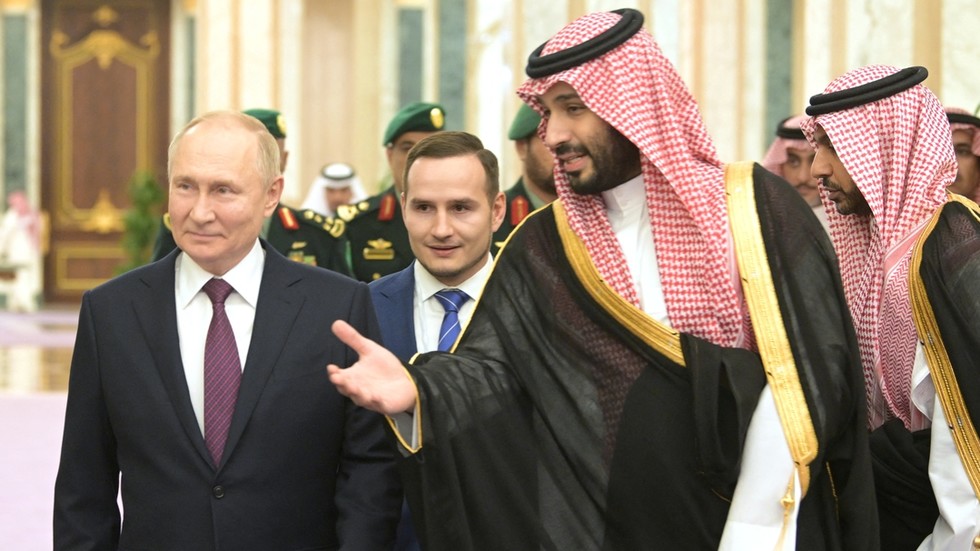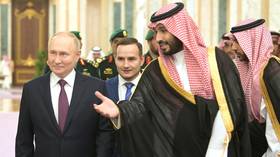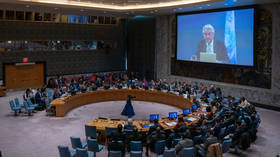
The Russian president traveled to the UAE and Saudi Arabia, and it wasn’t to enjoy some winter sunshine

By Fyodor Lukyanov, the editor-in-chief of Russia in Global Affairs, chairman of the Presidium of the Council on Foreign and Defense Policy, and research director of the Valdai International Discussion Club.
By Fyodor Lukyanov, the editor-in-chief of Russia in Global Affairs, chairman of the Presidium of the Council on Foreign and Defense Policy, and research director of the Valdai International Discussion Club.
Russia in Global AffairsRGA on Telegram

Russia’s President Vladimir Putin and Saudi Crown Prince Mohammed bin Salman attending a welcoming ceremony ahead of their talks in Riyadh on December 6, 2023. © Alexey NIKOLSKY / POOL / AFP
Russian President Vladimir Putin’s trip to Saudi Arabia and the United Arab Emirates, followed immediately by his Iranian counterpart’s visit to Moscow, reminded us of the importance that the Persian Gulf has acquired in international affairs, and especially in domestic foreign policy. It is not that the region has been ignored before; there have always been reasons to keep an eye on it. But these were mainly due to issues with natural resources and the geopolitical struggle to control them.
The structure of the international system has changed. Firstly, the so-called ‘middle powers’ – and all the countries I have mentioned belong to this category – play a much more important role than they did 10 to 15 years ago, and this influence is growing at the expense of the big countries. Second, regional politics is increasingly driven by regional forces, even if it is an area where major foreign interests converge.
The Gulf states have many issues in common, and almost all of them are of primary importance to Russia. The management of oil markets goes without saying. OPEC+ has proved surprisingly resilient to global military and political upheaval. Tensions within the club are growing, but so far it has been possible to find compromise. The importance of this for Russia, both economically (income) and politically (influence on global processes), can hardly be overestimated. The money issue is not just about regulating oil prices, but also about cooperation with the wealthy Arab monarchies. They are looking with interest at the opportunities offered by the Russian market, which is being freed from the Western presence, and are studying ways of circumventing the restrictions imposed by the US and Europe. Of course, no one wants to be exposed to Washington’s punitive measures, as the US has plenty of instruments to hurt the interests of its long-standing Arab partners. Hence the caution and extreme prudence.

Read more
But against the backdrop of global change, states that had previously adhered strictly to bloc discipline began to behave much more independently. The strained relations between the Saudi leadership and the administration of US President Joe Biden are well known. And it’s not just the tragic story of journalist Jamal Khashoggi or the rhetoric on rights and democracy. Riyadh has clearly grasped the global shifts and dramatically pushed the boundaries. They have not disappeared altogether, but they have undoubtedly widened. And the US must accept this with some reluctance. There is a great opportunity for countries that were previously in a subordinate position to change their situations and wriggle away from their long-term patron.
The common theme between Russia and the Gulf states is the situation in the Middle East. In general, Moscow’s serious return to the region began with the operation in Syria in 2015, when Russian intervention changed the course of events. It was then that the leading countries, led by Saudi Arabia, saw Russia for the first time as a truly significant actor. After that, real cooperation began.
Today, the region is witnessing yet another catastrophe in Gaza, the outcome of which may be contradictory. On the one hand, it demonstrates the impasse into which the Palestinian question has led everyone. On the other hand, there may be no fundamental change at all. One thing which everyone agrees on is the need for a new scheme of regional organization. Everyone has different aspirations, but no one has a ready-made recipe. In this sense, the participation of all parties – not only those who are interested, but also those who have some influence – is indispensable.

Read more
Of course, the Ukraine conflict is the priority issue for Russia. Strangely enough, the Persian Gulf states have turned out to be quite closely linked to it. Military and technical cooperation with Iran, the quiet diplomacy of Saudi Arabia, the UAE, and Qatar to resolve specific issues, and the general independence of the sub-region are all playing a greater role at present than anyone could have imagined two years ago.
Russian politics and diplomacy are being reorganized. Now that the West has disappeared from the Russian foreign policy palette (there is nothing but confrontation in this direction), new threads are being formed, sometimes quite spontaneously. In the case of the Gulf, however, it is worth treating it as a pillar. And not only because it is well resourced.
Russia’s international activities have yet to find a new balance. It is clear that China stands out simply because of its size and global role. But that is why any effective means of balancing it is particularly important. There are other powers in East and South Asia, but there is an element of rivalry between them and Beijing. However, the wealthy and influential states of West Asia, especially the Gulf monarchies, are a counterweight without the baggage of confrontation.
Iran, Saudi Arabia, and the UAE have an uneasy relationship. But all three will join BRICS+ next month, and that is a significant change. A promising type of international organization is not a club of like-minded people, but a gathering of those who can influence important processes in different ways and agree on the equal weight of that influence. Not easy, but effective.




